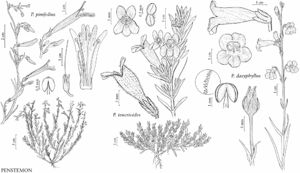Penstemon dasyphyllus
in W. H. Emory, Rep. U.S. Mex. Bound. 2(1): 112. 1859. (as Pentstemon)
Stems 20–50 cm, puberulent or retrorsely hairy proximally, puberulent and glandular-pubescent distally. Leaves puberulent or retrorsely hairy, sometimes only along midveins and margins; basal and proximal cauline 28–68 × 3–9 mm, blade oblanceolate to lanceolate or linear, base tapered, margins entire, apex obtuse to acute; cauline 6–9 pairs, 32–95 × 4–12 mm, blade lanceolate to linear, base tapered, apex acute. Thyrses ± secund, 6–28 cm, axis glandular-pubescent, verticillasters 4–11, cymes 1- or 2-flowered; proximal bracts lanceolate to linear, 4–35 × 1–4 mm; peduncles and pedicels glandular-pubescent. Flowers: calyx lobes ovate to lanceolate, 5–8 × 2–2.8 mm, glandular-pubescent; corolla violet to lavender to purple, lined internally abaxially with purple nectar guides, ventricose, 25–35 mm, glabrous internally, tube 7–9 mm, throat abruptly inflated, 9–10 mm diam., slightly 2-ridged abaxially; stamens: longer pair reaching orifice, pollen sacs divergent, 1.8–2.2 mm, sutures denticulate, teeth to 0.3 mm; staminode 17–19 mm, included, 0.6–1 mm diam.; style 15–20 mm. Capsules 11–15 × 7–9 mm. 2n = 16.
Phenology: Flowering Apr–Jul(–Sep).
Habitat: Rocky ridges, gravelly slopes, desert grasslands.
Elevation: 1100–1700 m.
Distribution
Ariz., N.Mex., Tex., Mexico (Chihuahua, Coahuila, Durango).
Discussion
In the flora area, Penstemon dasyphyllus is known from southeastern Arizona (Cochise, Gila, Pima, Pinal, and Santa Cruz counties), southwestern New Mexico (Hidalgo and Luna counties), and western Texas (Brewster, Crockett, Pecos, Presidio, and Terrell counties). Populations are documented southward to northern Durango, Mexico.
Selected References
None.
